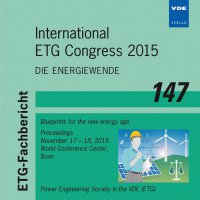Simulation of the life-time consumption from oil-immersed transformers with consideration of the further development of decentralized PV feed-in
Konferenz: International ETG Congress 2015 - Die Energiewende - Blueprints for the new energy age
17.11.2015 - 18.11.2015 in Bonn, Germany
Tagungsband: International ETG Congress 2015
Seiten: 8Sprache: EnglischTyp: PDF
Persönliche VDE-Mitglieder erhalten auf diesen Artikel 10% Rabatt
Autoren:
Stakic, David E.; Ebe, Falko; Ruf, Holger; Heilscher, Gerd (Ulm University of Applied Science, Ulm, Germany)
Meier, Florian (Stadtwerke Ulm/Neu-Ulm Netze GmbH, Ulm, Germany)
Inhalt:
Aging is an important factor to be considered by distribution grid operators when using oil-immersed power transformers. The life-time consumption mainly depends on the decomposition of the organic parts in the isolation paper and the oil. With a high number of photovoltaic systems in the distribution grid the worst-case-scenario changes from high power demand during low outdoor temperatures times in the winter to high feed-in power with high outdoor temperatures in the summer. The temperature increases the reaction rate of the chemical processes and affects the life-time consumption exponentially. An alternative to the evaluation of the highest power value per year is introduced by the national standard DIN 60076-7. The standard considers transferred power and transformer environment temperature as time series. By extending the simulation model with a simulative representation of the transformer housing it is possible to consider the influence of the housing in more detailed way. This allows the evaluation of the stress to the transformer by using available data without the need for additional field measurement. The benefit of this extension is demonstrated for six different scenarios of the PV penetration. The results of the first analysis demonstrates that the temperature and power combination in areas with a high amount of PV feed-in power gains additional life-time consumption that are not calculated in the common evaluation methods of distribution system operator.


